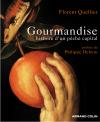Parution – Gourmandise. Histoire d’un péché capital
Florent Quellier, Gourmandise. Histoire d’un péché capital, Paris, Armand Colin, 2010, 224 pages.
Entre rêves de Cocagne et franches ripailles rabelaisiennes, ce livre nous convie à un voyage en gourmandise à la recherche d’un péché capital bien ambigu.
Gourmandise ? Faut-il entendre la goinfrerie que l’Église et les bonnes manières réprouvent dès le Moyen Âge ? L’art de la bonne chère cultivé à loisir par de distingués gourmets ? Le penchant naturel des enfants pour les sucreries ? Ou encore un univers féminin de friandises et de mignardises ? Autant d’interrogations qui nourrissent cet ouvrage.
Songeons que le gras a longtemps peuplé les rêves de bonne chère en Occident, que le chocolat a fait fantasmer la population et troublé les couvents, que les Belles veillaient à entretenir leur appétissant embonpoint.
Même l’Église catholique a enseigné les plaisirs honnêtes de la table au mépris des violentes critiques protestantes… Las ! le péché de gourmandise a été laïcisé par un discours diététique moralisateur et par l’obsession contemporaine de la minceur.
Un livre d’histoire tout en saveur, servi par une riche illustration.
Florent Quellier, historien, est maître de conférences à l’université François- Rabelais de Tours et titulaire d’une chaire CNRS histoire de l’alimentation des mondes modernes. Il a publié en 2007, aux Presses Universitaires de Rennes, La Table des Français. Une histoire culturelle (XVe – début XIXe siècle).
Préface de Philippe Delerm
Introduction : les mots de la gourmandise
Chapitre 1 : La gloutonnerie ou la voracité de ventre au Moyen Âge
Chapitre 2 : Gourmandises de Cocagne
Chapitre 3 : Volupté catholique, austérité protestante
Chapitre 4 : Le régne des frians et des gourmets
Chapitre 5 : L’âge de l’éloquence gourmande
Chapitre 6 : La gourmandise, une faiblesse du sexe faible
Chapitre 7 : Saveurs d’enfance, une infantilisation de la gourmandise
Conclusion : Le retour du péché de gourmandise
Épilogue : « Je prendrais bien encore un sanglier »


 Literature and Medicine, Volume 28, Number 2, Fall 2009
Literature and Medicine, Volume 28, Number 2, Fall 2009